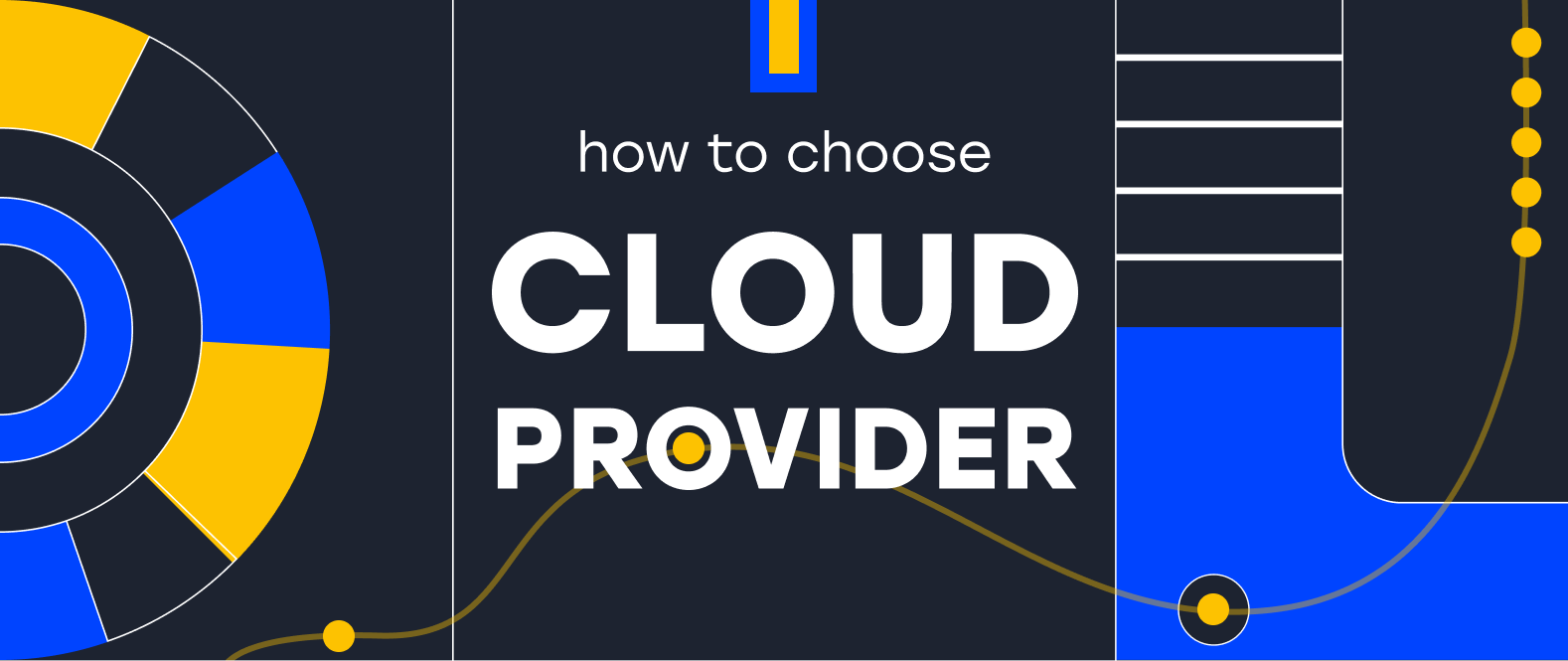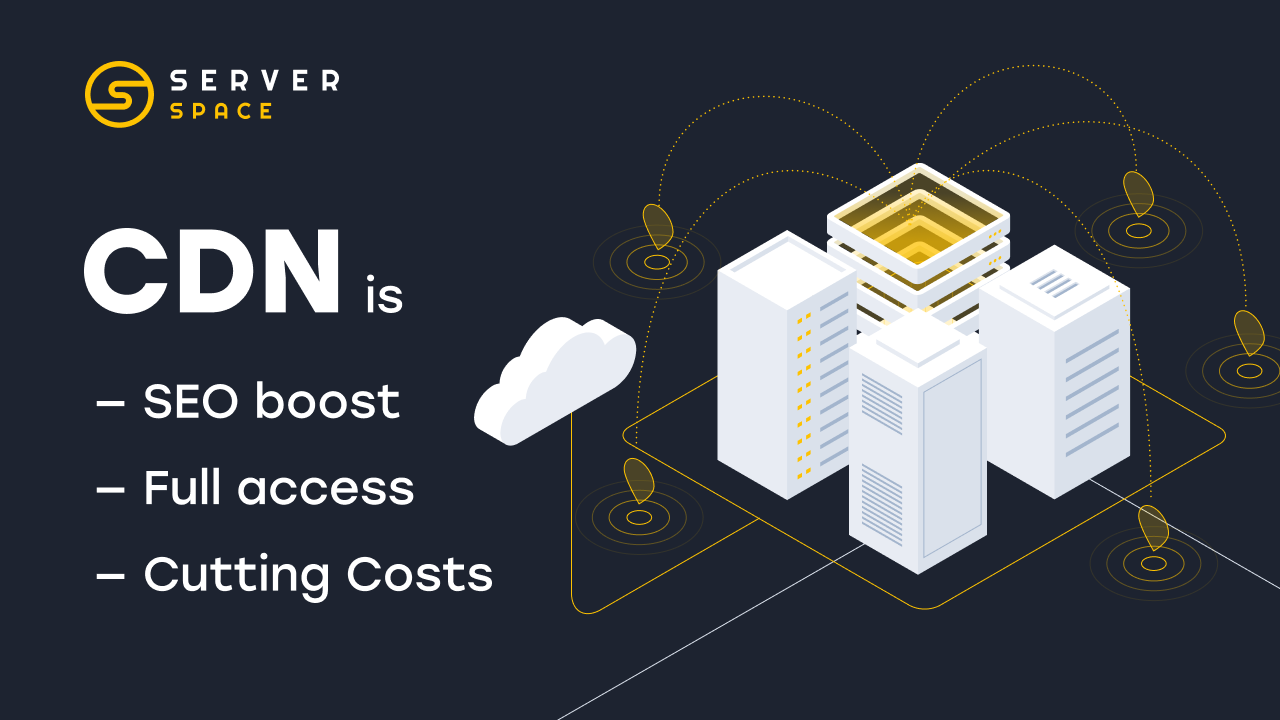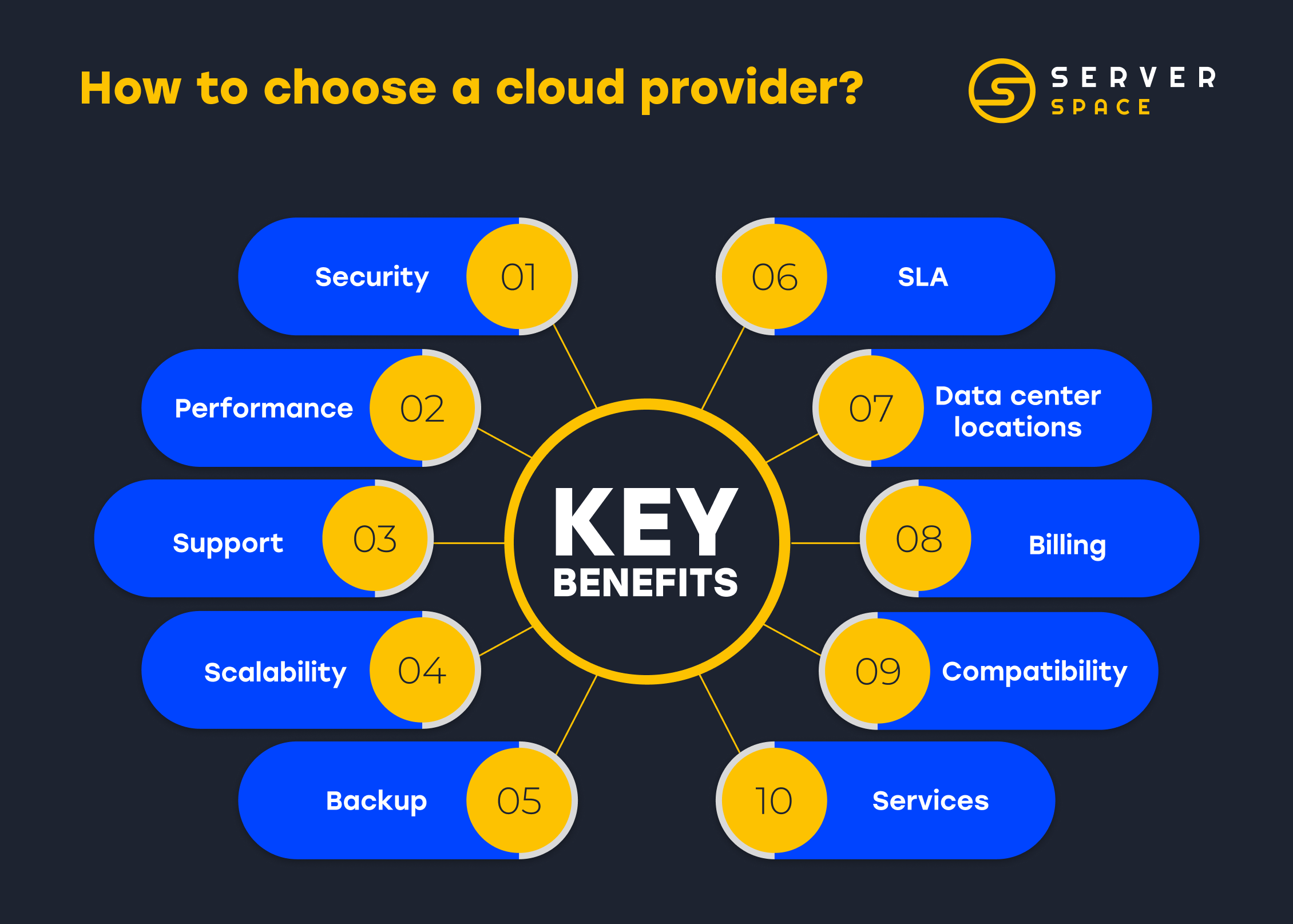How to choose a cloud provider?

Nowadays, more and more companies are choosing cloud computing technologies for IT infrastructure development. The cloud platform gives unique opportunities for scaling, high performance, and automation of business processes at cost-effective prices. That's why if you're looking for the optimal solution for data storage, network configuration, or website optimization, it's time to think about migrating to the cloud.
However, the question for everyone is: how to choose a cloud service provider? After all, the choice of cloud server providers affects the quality of the offered services and the final result. The more reliable the cloud service provider is, the higher the chance that your business will take a new level.
In this article, we will explain how to make sense of the variety of cloud providers on the market. With our help, you can choose the best cloud VPS provider for your needs.
When choosing a cloud provider, you should always consider the following factors:
Security and reliability
- The must-have attributes of the top cloud service provider's reliability are:
- Tier III level or higher for the data center;
- Redundancy of infrastructure nodes for fault tolerance within the pool;
- High level of physical security in data centers (cameras, restricted access to server rooms, security guards).
- Two-factor authentication (2FA)
Make sure your cloud provider offers protection against DDoS attacks. A DDoS attack will allow your competitors to take out your website, server, or virtual infrastructure. Therefore, you should not forget about this point when looking for a cloud-based provider.
High-Performance
Performance factor is also one of the key parameters when selecting a cloud provider. It affects such aspects as:
- Low Latency. It is very important for user satisfaction, especially in customer-centric applications. Latency can lead to a loss of business. A top cloud server with optimized network configurations and edge computing capabilities can significantly reduce latency.
- Bandwidth. A cloud network providers with a reliable network guarantee fast and stable data transfer, which is critical for applications that require real-time access to data in multiple locations.
- Computing performance. The ability to process data quickly, perform complex calculations, and manage multiple operations simultaneously is directly related to compute performance. This is where the processing power and efficiency of the cloud provider's infrastructure come to the fore. Top VPS-hosting providers use only the highest-end processors and modern virtualization platforms.
Support
Don't underestimate the quality of technical support. Professional technical support can significantly improve your experience using cloud solutions. It can solve problems or advise you on any issues. We recommend relying on the following characteristics:
- Free availability. As a rule, paid charging of technical support is used by providers that are aimed at mass sales. These companies do not offer a customized approach, so you are hardly satisfied with the support service.
- 24/7. This indicator is quite important because the business may incur losses if you don't get timely help. You can be anywhere in the world and not be tied to a particular time zone to receive a consultation. You should also consider the response time to requests. The shorter the response time, the better. For example, the average response time for Serverspace technical support is only 15 minutes.
- Localized. Specialists should offer help in a language that you speak and understand fluently. That is the only way their support can be helpful to you and will not cause further difficulties.
- Migration assistance. Make sure your provider of cloud services assists in migrating your business to the cloud.
Scalability and flexibility
This parameter is one of the key factors in choosing a cloud VPS provider for several reasons:
- Adaptability to growth. As businesses expand, their data and computing needs grow. Scalability ensures that a cloud service can accommodate this growth, allowing for the addition of resources without the need for significant infrastructure changes or downtime.
- Handling traffic spikes. Many businesses experience fluctuating levels of web traffic. Scalability allows for rapid adjustment to these changes, ensuring that the website or application remains operational during peak traffic periods without incurring extra costs during slower times.
- Innovation and speed to market. The ability to quickly scale resources up or down supports faster development and deployment of new products or services. This agility can provide a competitive advantage in rapidly changing markets.
- Customization. Flexible cloud solutions allow businesses to tailor their environment to specific needs, whether for specialized computing requirements, compliance, or data sovereignty issues.
Top cloud providers give you the ability to instantly scale resources and change configurations at any time.
Backup
Having a reliable data backup strategy is crucial for optimizing operations for every business. Here’s the rationale:
- Data safety. Backup systems safeguard your data from losses caused by equipment malfunctions, cyber incidents, mistakes made by people, or catastrophic events.
- Operational resilience. Efficient backup solutions guarantee quick restoration of vital data after a loss, reducing operational pauses and securing uninterrupted business activities. This is key to preserving customer loyalty and mitigating substantial economic setbacks.
- Regulatory adherence. Various sectors are subject to rules mandating that data be preserved and accessible for certain durations. Opting for a cloud service with strong backup features ensures adherence to these legal and compliance standards, steering clear of possible penalties and legal complications.
- Recovery. An effective backup plan is fundamental to any disaster recovery strategy, allowing firms to swiftly resume activities by accessing recent data backups.
In evaluating cloud services, it's important to scrutinize their data backup functionalities and the duration for which backups are maintained.
SLA
The SLA provides a legally binding agreement that outlines service expectations, safeguards your interests, and ensures accountability from the cloud technology provider. Make sure that the following clauses are present when reviewing the cloud provider's SLA:
- Guaranteed performance. The SLA should specify the performance standards you can expect from your hosting provider, including uptime, data transfer rates, and response times.
- Reliability and availability. Cloud providers should commit to maintaining a high level of service availability. The optimal SLA availability level is above 99.9%.
- Compensation for downtime. Look out for clauses that provide compensation if service performance falls below an agreed-upon level. This can be in the form of credits or refunds, providing financial protection for businesses affected by service failures.
- Clear expectations. The SLA should set clear expectations between the cloud provider and the customer.
- Disaster recovery and data protection. Ensure that the SLA outlines the provider's responsibilities for data backup, disaster recovery, and security measures. This ensures that the provider has mechanisms for protecting your data from loss or leakage.
Data center locations
The data center's location has a fundamental impact on the quality of your services. The optimal solution is to choose a data center that is located close to the country of your primary audience. And why:
- User proximity. Best cloud web hosting closer to your users reduces latency, improving the loading speed of websites and applications.
- Legal compliance. Data storage can be a requirement for certain types of businesses, especially due to privacy legislation and other regulatory restrictions. Hosting data within a specific country helps ensure compliance with local laws and regulations.
- Connectivity stability. Choosing local hosting can ensure greater connectivity and stability, which is especially important for business applications and services that require constant availability.
A CDN is needed to speed up the delivery of content to the end user and make the website run faster. CDN operation depends entirely on the number and location of data centers around the world. For example, CDN servers of the Serverspace are deployed in six data centers on different continents. You can read more about it here.

Billing
When choosing a cloud provider, you should pay attention to the types of billing:
- Allocation pool: payment for a dedicated pool of resources for the virtual environment. It is calculated monthly. Suitable for: large enterprises or organizations with stable and predictable workloads.
- Pay-as-you-go: you pay only for leased resources used for a certain period. For example, payments can be deducted every hour or every few minutes. Suitable for: startups, small to medium-sized businesses (SMBs), or any company with fluctuating demands.
- Reservation pool: charges for a guaranteed number of resources that are reserved for a user, regardless of the availability or utilization of resources by other customers. Calculated on a per-month basis. Suitable for medium- to large enterprises with predictable resource needs.
Each payment model offers distinct advantages depending on the company's size, budget, workload variability, and capacity planning capabilities. You should evaluate their operational patterns and financial strategies to select the most appropriate model.
Compatibility and Integration
This parameter refers to how well the cloud services align with and can be incorporated into an organization's existing IT infrastructure, applications, and workflows. It includes several key aspects:
- Technical compatibility. Ensures that the cloud provider's technology stack can seamlessly interact with your current systems, software, and data formats without requiring extensive modifications or workarounds.
- Integration capabilities. It involves the ease with which cloud services can be connected to existing business applications and data sources. This includes the availability of APIs, middleware, and tools that facilitate the smooth exchange of data and functionality across different environments.
- Operational alignment. The degree to which cloud services support your organization's operational practices, including deployment methodologies, management processes, and security protocols, ensures that the move to the cloud does not disrupt existing operations.
- Future flexibility. The ability of cloud services to not only integrate with current technologies but also adapt to future technological advancements and business requirements.
Various services
Another aspect you should consider when comparing cloud providers is how many services they can offer you.
An extensive selection of services means that a company can identify the precise tools and functionalities required for supporting diverse operational needs, encompassing everything from data storage and processing to advanced analytics and artificial intelligence capabilities.
The richer the best cloud hosting services a cloud provider presents, the broader the scope for personalization. Companies have the opportunity to combine different services to forge customized solutions that align perfectly with their unique requirements, circumventing the need to compromise their processes due to a provider's limited offerings.
What you need to do before choosing a cloud based provider
Before selecting a VPS hosting provider, it is important to do thorough preparation and analysis to ensure that cloud solutions will meet your project goals and needs. Here are the basic steps to help you make the right choice:
- Analyze project needs: start with a thorough understanding of your project goals and business specifics. Assess what applications and services you'll need, what your performance expectations are, and what your scalability requirements are. This will help you determine if the cloud is the right fit for your needs.
- Evaluate the feasibility of cloud services. Assess whether moving to cloud services will benefit your business. Consider factors such as cost, flexibility, access to the latest technology, and the ability to focus on core business processes.
- Choose the right type of the service: determine which cloud service model is best for your project. Providers offer three types of cloud services: IaaS, PaaS, and SaaS. You can learn more about this topic in our article.
- Estimate required resources and security requirements: decide on the computing power, storage capacity, network bandwidth, and data protection standards you need for your project.
- Expense benchmarking: compare prices across providers, considering not only the cost of resources but also additional costs such as data transfer and support services.
Common mistakes
Let's take a review of the typical mistakes companies make when trying to find the top cloud server provider:
- Underestimating security requirements: overlooking security aspects exposes data to threats like breaches and leaks.
Example: A company chooses a cloud provider without robust encryption, leading to a data breach exposing customer information. - Ignoring hidden costs: failing to account for additional expenses related to data storage, transfer, and extra services can lead to unexpected costs.
Example: A business is surprised by high fees for data egress that were not initially considered in the budget. - Overlooking scalability: opting for a provider without flexible scalability can limit business growth, making it difficult and costly to add resources.
Example: An e-commerce platform experiences slow performance during peak sales due to the inability to scale resources quickly. - Lack of strategic planning: without understanding how cloud services integrate with business goals, companies may find solutions that don't meet their needs.
Example: A firm migrates to the cloud without planning how to integrate with existing on-premise databases, resulting in operational inefficiencies. - Neglect the SLA: not paying attention to the Service Level Agreement means no guarantees on service quality or downtime compensations.
Example: A business suffers from extended downtime without compensation, only to realize their SLA does not cover such incidents. - Ignoring Compatibility Requirements: choosing a provider that doesn’t ensure full compatibility with existing IT infrastructure leads to extra costs and integration challenges.
Example: An enterprise finds its productivity software is not supported by the new cloud environment, requiring an unexpected investment in new tools.
What's the bottom line?

So we can conclude that the selection of a cloud provider goes beyond a simple choice. It is a fundamental step in shaping your organization's digital future. This is a critical decision that can open new avenues for innovation and enhance your competitive advantage in an ever-evolving marketplace.
Your choice should be thoughtful and based on a comprehensive understanding of the unique needs of your project and the nuances of potential cloud provider offerings. Let that decision be based on insight, foresight, and a deep vision for your organization. Compare cloud providers and begin your cloud journey.
This is how cloud technology will ensure a future for your business that is not only responsive to change but resilient to it.



